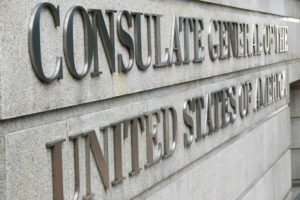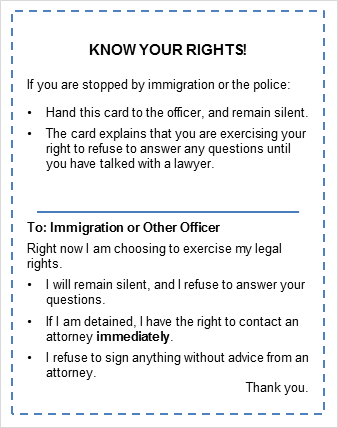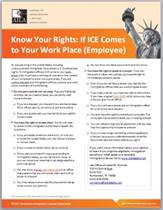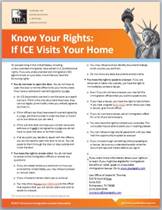 Consular processing is one of two paths for obtaining an immigrant visa (green card) to the United States. The other path is “adjustment of status.” If the applicant is outside the U.S., the only path for immigrating to the U.S. is to use consular processing.
Consular processing is one of two paths for obtaining an immigrant visa (green card) to the United States. The other path is “adjustment of status.” If the applicant is outside the U.S., the only path for immigrating to the U.S. is to use consular processing.
Consular processing refers to the process of applying for a visa through the U.S. consulate in a foreign country. Some applicants prefer consular processing over adjustment of status because it generally has a shorter processing time (about 4-6 months). What’s more, consular processing has a lower risk of refusal. Unlike USCIS officers, consular officers cannot refuse to issue a visa based on discretion. This means that the consular officer must have specific, factual evidence for denying an application. However, cases that are denied are generally non-reviewable. This means that it is a final decision.
The Law Office of Jessie M. Thomas offers full service legal counsel for consular processing. We guide your through every step in the process and ensure that you have a complete and thoroughly prepared application. We also help prepare you for your interview. Call us (214) 838-0045.
Examples Where Consular Processing May Be Chosen
- Ola is an Alien living outside the U.S. He is not eligible to apply for adjustment of status. Ola may only apply for consular processing.
- Katia is an Alien in the U.S. and is in a valid non-immigrant status. Katia may apply for either consular processing or adjustment of status after obtaining an approved immigration petition.
- Jose is an Alien living in Texas. Jose has an approved family-based immigration petition and a visa number is available. Because the time frame for adjustment of status based on a family-based immigration petition is long, Jose chooses to apply for consular processing for strategic reasons.
- Gunnar has an approved National Interest Waiver petition, but Gunnar’s H-1B is going to expire. Gunnar may apply either for consular processing or adjustment of status. Because applying for adjustment of status has the benefit of a work permit, Gunnar chooses to apply for adjustment of status.
- Lijuan has an approved National Interest Waiver petition. Lijuan was from China with a J-1 visa and it is very hard for her to get a J-1 waiver. Moreover, the immigrant visa number has a long backlog. Lijuan decides to go back to China to reside for two years to meet the home country residency requirement. After she resides in China for two years and her immigrant visa number becomes available, Lijuan may apply for consular processing.
Be certain to ask a prospective lawyer if their immigration service just includes the initial filing steps in the U.S. or whether they also include the critical consular processing steps. Prior experience working with the US consulate you will be dealing with is also highly valuable.
Steps for Consular Processing
- Determine Your Basis to Immigrate
The first step in consular processing is to determine if you fit into a specific immigrant category. Most immigrants become eligible for a green card (permanent residence) through a petition filed on your behalf by a family member or employer. Others become permanent residents through first obtaining refugee or asylum status, or through a number of other special provisions.
- File the immigration Petition
- Family Based
Family based categories require that a U.S. citizen or permanent resident relative file a Form I-130, Petition for Alien Relative, for you. For more information, see our Family Based Green Card page.
- Employment Based
Employment based categories most often require the intending U.S. employer to file a Form I-140, Petition for Alien Worker, for you. Entrepreneurs who intend to invest significant amounts of capital into a business venture in the United States may file Form I-526, Immigrant Petition by Alien Entrepreneur” on their own behalf. For more information, see our Employment Visa page.
- Special Classes of Immigrants
- Humanitarian Based
- Wait for a Decision on the Petition
USCIS will notify the petitioner of a decision. If the petition is denied, the notice will include the reasons for denying the petition and any rights to appeal the decision. If the petition is approved, USCIS will send the approved petition to the Department of State’s National Visa Center (NVC), where it will remain until an immigrant visa number is available. See the USCIS Visa Availability & Priority Dates page for more information.
- Wait for Notification from National Visa Center
The National Visa Center, which is responsible for the collection of visa application fees and supporting documentation, will notify the petitioner and beneficiary when the visa petition is received and again when an immigrant visa number is about to become available. They will also notify the petitioner and beneficiary of when they must submit immigrant visa processing fees and supporting documentation. Check the latest Visa Bulletin.
- Attend Consular Appointment
Once a visa is available or a beneficiary’s priority date is current, the consular office will schedule the applicant for an interview. The consular office will complete processing of the applicant’s case and decide if the beneficiary is eligible for an immigrant visa.
- Enter the United States
If you are granted an immigrant visa (green card), the consular officer will give you a packet of information. This packet is known as a “Visa Packet.” Upon your arrival to the United States, you should give your Visa Packet to the Customs and Border Protection officer at the port of entry. You will be inspected by a Customs and Border Protection officer and if found admissible, you will be admitted as a permanent resident of the United States. This gives you the authority to live and work in the United States permanently.
- Receive Your Green Card
You will be mailed your green card. If you do not receive your green card within 45 days of your arrival in the U.S., call the USCIS National Customer Service Center at 1-800-375-5283 or visit your local office by making an InfoPass appointment.
An experienced immigration attorney can help determine if consular processing is the right option for you. Call the Law Office Jessie M. Thomas today (214) 838-0045.
 The American Institute Of Legal Counsel (AIOLC) has recognized the exceptional performance of Texas Immigration Attorney Jessie M. Thomas as 2017 “10 Best Immigration Attorney” for Client Satisfaction.
The American Institute Of Legal Counsel (AIOLC) has recognized the exceptional performance of Texas Immigration Attorney Jessie M. Thomas as 2017 “10 Best Immigration Attorney” for Client Satisfaction. The American Institute Of Legal Counsel is a third-party attorney rating organization that publishes an annual list of Top 10 Immigration Attorneys in each state. Attorneys who are selected to the “10 Best” list must pass AIOLC’s rigorous selection process, which is based on client and/or peer nominations, thorough research, and AIOLC’s independent evaluation. AIOLC’s annual list was created to be used as a resource for clients during the attorney selection process.
The American Institute Of Legal Counsel is a third-party attorney rating organization that publishes an annual list of Top 10 Immigration Attorneys in each state. Attorneys who are selected to the “10 Best” list must pass AIOLC’s rigorous selection process, which is based on client and/or peer nominations, thorough research, and AIOLC’s independent evaluation. AIOLC’s annual list was created to be used as a resource for clients during the attorney selection process. One of the most significant aspects of the selection process involves attorneys’ relationships and reputation among his or her clients. As clients should be an attorney’s top priority, AIOLC places the utmost emphasis on selecting lawyers who have achieved significant success in the field of Legal Counsel without sacrificing the service and support they provide. Selection criteria therefore focuses on attorneys who demonstrate the highest standards of Client Satisfaction.
One of the most significant aspects of the selection process involves attorneys’ relationships and reputation among his or her clients. As clients should be an attorney’s top priority, AIOLC places the utmost emphasis on selecting lawyers who have achieved significant success in the field of Legal Counsel without sacrificing the service and support they provide. Selection criteria therefore focuses on attorneys who demonstrate the highest standards of Client Satisfaction.



 Consular processing is one of two paths for obtaining an immigrant visa (green card) to the United States. The other path is “
Consular processing is one of two paths for obtaining an immigrant visa (green card) to the United States. The other path is “